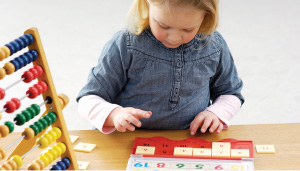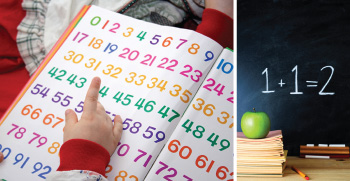Mathematics: some love it, some endure it and some feel it’s been an up-hill struggle. As a parent how do you enable your child’s interest and ability in mathematics? This article will provide you with insight, tips and confidence to facilitate your child’s learning, plus fostering a love for mathematics.
The first mathematics teacher your child experiences has quite a responsibility. It’s an important or, you could say, ‘critical’ role. Let’s hope they know what they are doing and have the patience, dedication and understanding of some fundamentals to be effective; it is of course you!
You will most likely be the teacher with whom they learn for the longest period of time as well. Are you feeling confident?
In terms of the most effective educational practices and ways of facilitating mathematical learning, opinions differ between countries, districts, schools on the same street and even between classrooms next door to each other within the same school. There are, however, some ideas on early development that share widespread support.
 Are you ready for your challenge? Read on. When entering the world, children are surrounded by the use of a highly developed and sophisticated number system that has evolved over thousands of years. Your child has rather less time, though, to get to grips with the early fundamentals of a discipline that not only equips us with vital life skills to communicate, save lives, function, research and evolve in a vast number of areas.
Are you ready for your challenge? Read on. When entering the world, children are surrounded by the use of a highly developed and sophisticated number system that has evolved over thousands of years. Your child has rather less time, though, to get to grips with the early fundamentals of a discipline that not only equips us with vital life skills to communicate, save lives, function, research and evolve in a vast number of areas.
Children see, experience and are aware of ‘numbers’ very early in life: on birthday cards, clocks, on television, in shops and on signs. These though are not strictly ‘numbers’ but are squiggles (to children) or symbols that we use to represent quantities.
Part of our role is to attach this meaning as quantities to these symbols through life experiences. The early experiences we provide for our children establish the relationships between quantities, associated language and symbols. They also allow us to explore the relationships between different quantities.
 To set a context for the importance of these early experiences, we will consider one of the foremost educational theories, which is reflected in our high quality contemporary classrooms. This is the theory of constructivism which has many variants, but essentially embraces the idea that how children learn and the impact of how they internalise their experiences is based on already embedded ideas and experiences.
To set a context for the importance of these early experiences, we will consider one of the foremost educational theories, which is reflected in our high quality contemporary classrooms. This is the theory of constructivism which has many variants, but essentially embraces the idea that how children learn and the impact of how they internalise their experiences is based on already embedded ideas and experiences.
What this means for you as parents, and teachers, is that you cannot expect all children to learn in the same way and at the same rate. You cannot expect children to readily embrace what they are not yet cognitively ready for. Appropriate early experiences are critical for preparing the construction ground that schools will help you build upon.
The big message is to provide early experiences through interacting with your child whilst playing, shopping, singing, cooking, arts and craft activities, going up and down stairs. Try to exploit the opportunities that present themselves on a day-to-day basis in order to support your child’s development and understanding.
These experiences develop relating numerals to amounts, counting items and explaining ideas of ‘more’ and ‘less’. It’s also useful to play with addition and subtraction, as well as talking through the language and experience as it relates to addition and subtraction.
The relationships
 When children have fully developed number concepts, they understand the number as a label for an amount and understand that there is a relationship of increase or decrease with the surrounding numbers. We would recommend Numicon for helping establish this grip on the relationships. The Numicon pieces form a ‘staircase’ type image when arranged in a number line.
When children have fully developed number concepts, they understand the number as a label for an amount and understand that there is a relationship of increase or decrease with the surrounding numbers. We would recommend Numicon for helping establish this grip on the relationships. The Numicon pieces form a ‘staircase’ type image when arranged in a number line.
This not only provides a visual and tactile experience of relationships, but with adult questioning, deepens the understanding. For example, what do you notice about the sizes of three and four? When the pieces are in order, move a few around and ask, why is this not right? Can we fix it? Where should this piece go? Why?
A real staircase is even better, of course. Number the steps with number dots as on a dice, or with numerals.
Ask questions relating to the relationships between the numbers on the steps as well as questions that encourage this early experience and understanding of plus and minus. Questions which ask your child to find step five, and what step they would be on if they went three steps higher than the one they are standing on are equally helpful.
A good indication of children having fully developed number concepts is if they can apply this relational knowledge. If your child, aged four-five, can tell you, for example, what one or two bigger, or smaller, than seven is, without needing to count or use visual prompts, you could say that concepts of those numbers were reaching a solid level.
Dos and DoN’Ts
 Take advantage of opportunities that arise in daily life; e.g., in the supermarket, ask your child ‘’Please find six carrots for our dinner.’’
Take advantage of opportunities that arise in daily life; e.g., in the supermarket, ask your child ‘’Please find six carrots for our dinner.’’- Keep using the language of numbers and more and less. .’Would you like one more story tonight? How many will that be altogether then?’’
- Look for patterns through play. There are plenty to understand and exploit in mathematics; an early feel for pattern is important.
- Sing number songs and rhymes.
- Include counting in household activities. For example, ’’Can you find three more water cups for our tea party?’’
- Ask children to pay in shops and to get the change. A great question to ask and discuss when receiving change is. ’’Why did he/she give you this money back when you were buying things?’’ Many children struggle with this idea when it appears in the school curriculum.
- Try to avoid expecting too much too soon. Remember the idea of the unprepared construction site.
- Avoid showing any signs of frustration at all if something is difficult for your child. There are children who do not look forward to mathematics lessons, or who have negative emotions in this area. Do not plant the early seeds! Enjoy creating and being involved in the experiences and praise all efforts!




































